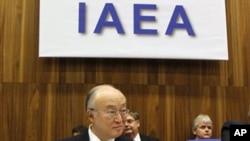The United Nation's atomic energy chief said business as usual was no longer possible after the ongoing disaster at Japan's Fukushima Daiichi nuclear power plant. Yukia Amano's remarks were made at a meeting on nuclear safety in Vienna.
Amano said the situation at the plant remained very serious. While the first priority was to manage the crisis, he said the world must begin considering its longer term lessons.
"The worries of millions of people throughout the world about whether nuclear energy is safe must be taken seriously. Rigorous adherence to the most robust safety standards and full transparency in good times and bad are vital for restoring and maintaining confidence in nuclear power," he said.
Amano spoke at the opening of a 10-day conference in Vienna gathering signatories of a nuclear safety treaty that was drawn up after the 1986 Chernobyl nuclear disaster, in Ukraine.
The Fukushima Daiichi crisis, triggered by Japan's March earthquake and tsunami, is considered the world's second most serious nuclear accident, after Chernobyl.
Amano said a team of experts would be dispatched to assess the accident at the Japanese plant. He said the IAEA will host a ministerial meeting of its members in June on nuclear safety.
But he also noted that international interest in nuclear power continues to grow.
"The basic power drivers behind the interest in nuclear power have not changed as a result of Fukushima. These include rising global energy demand as well as concerns about climate change, volatile fossil fuel prices and energy security," he said.
Amano said more than 60 countries notified the IAEA last year that they were interested in starting nuclear power programs. And most of the 29 countries that have nuclear power plan to expand it.
UN: World Must Learn Safety Lessons from Japan Accident

United Nation's atomic energy chief Yukia Amano says team of experts would be dispatched to assess accident at Japanese plant











